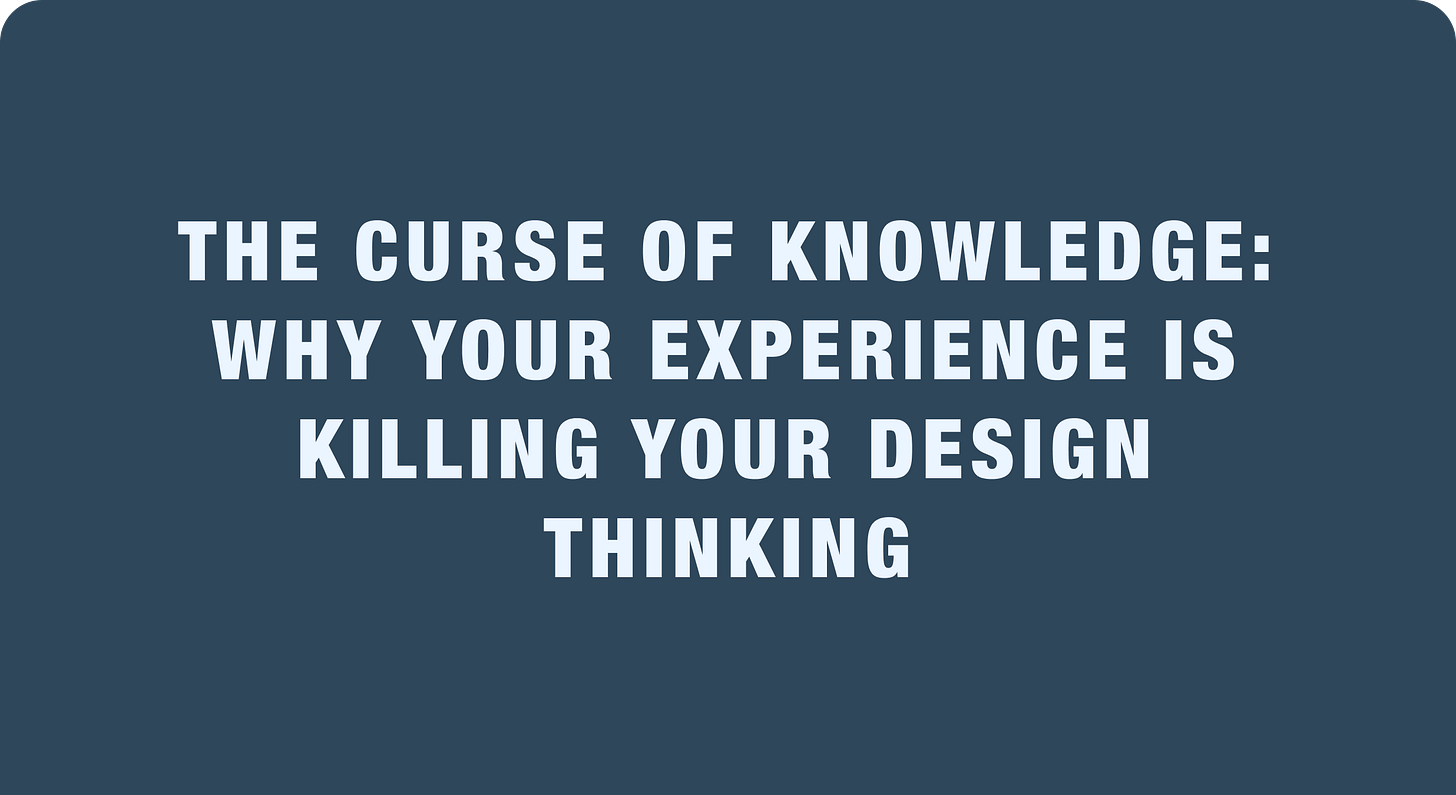The Curse of Knowledge: Why Your Experience is Killing Your Design Thinking
Why Your Design Thinking Workshops are Broken: And How to Fix It
Davíð Oddsson had a long political career, a strong resume of powerful stops in the Icelandic government, and even Governed the Icelandic Central bank, despite not having a degree in economics.
A couple of years into his tenure the bank collapsed. And after a formal investigation, he was charged with negligence.
What happened? He had plenty of experience managing and directing orgs at the highest level of his government. How then did he run the central bank into the ground?
Adam Grant does a great job summarizing a post-mortem in his amazing book “Think Again”, but I will summarize here a couple of Adams points:
Oddsson was notoriously overconfident in the role of his experience in his career success. He was a known denier of the expertise of others and even disbanded the Icelandic Economic Council during his time at the central bank.
The curse of knowledge
If you read my last article on design thinking, “You Might be Wrong About Design Thinking” I talk about things that go wrong in design thinking.
Three things are usually at fault when a design think initiative fails:
There is no experimentation to vet abductions. (aka The Build Trap)
There are no abductions defined. Meaning all builds are likely based on inductions. (aka Inductive Fallacy)
Or both, there are a bunch of inductions from some half-formed post-it note brainstorming session and no experimentation to de-risk those assumptions.
Design Thinking is really just a philosophy that respects the unseen connections between things (Abductions) and believes in running experiments to make those connections visible.
Design thinking is also an insurance policy from the “curse of knowledge” in the form of overconfidence in someone's inductions, which is the seen connections between things based on one’s life experience. The shorthand for someone like Davíð Oddsson having confidence in his past success and experience is called “The Inductive Fallacy”.
Your experience usually doesn’t matter outside of yourself
We are all guilty of making inductive fallacies. Whenever you judge someone’s ideas as “bad” because your life experiences towards a similar idea were “bad”.
An inductive fallacy is rampant in terms like “We already tried that, and it didn’t work” or “This is just how we do things!” or “If it ain’t broke, don’t fix it”.
The problem with inductions is that it’s based on experience, and experiences vary widely from person to person. So rarely should your life experience—with all the randomness, luck, and privileges (or lack thereof) be treated as useful in someone else’s context.
Think about the ROI of college. Someone like my mother, who became very successful dropping out will tell you it isn’t necessary. Yet a first-generation immigrant will attribute their standing in life to their MBA.
Many people who go to college get behind, crippled by student debt, and others become very wealthy with their education.
How do reconcile those experiences?
My opinion is you don’t. Conclusions like those are just inductions, and if taken seriously are logical fallacies.
The answer to the “ROI of college” is not a policy problem or truth claim problem, you can be successful either way. When it comes to the ROI of college for you, it really is a design problem. And solutions to design problems are rarely obvious.
The solutions to design problems comes from the framing
Choosing not to engage directly with the experiences of others—their inductions—is the first step to being a great design thinker.
The second step is approaching people’s experiences with curiosity. Make inferences on why someone gets value out of a college and why some do not. This is called abductive reasoning.
All design thinking exercises aim to encourage this type of thinking to find the actual problem.
You could make abductions that many people get poorer through college because of the type of degree they get.
Written as this premise you have something you can dig deeper on:
“Some college graduates get crippled by debt and others build massive wealth with their degrees. Maybe it has less to do with college and the degrees they chose to invest in…”
This abduction is great because instead of taking other people's experiences at face value, you look at the experience and try to infer what is going on. Instead of leading with judgment, you lead with curiosity. This leads to a great reframe:
Maybe it’s the degrees they invest in…
This is a lead for discovery, you can do more in-depth research from this point. You can pull data from graduates who failed to get an ROI and those who did and see what degrees they chose to get a better understanding of the problem.
There is more work moving forward from this reframe, but that is the point, it is hard work to break down and frame a problem.
There are no short-cuts, this work needs to be done, that’s why companies hire people to just focus on problem framing and communicating that framing.
This is the hard, emotional work that Davíð Oddsson refused to do.
Sure, it’s much easier and less expensive, in the short term, to pull from personal experience and build something, but then, you risk not knowing what you are talking about.

